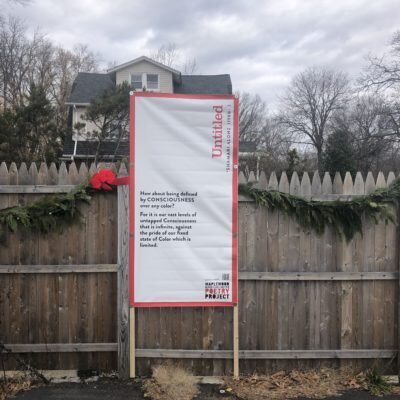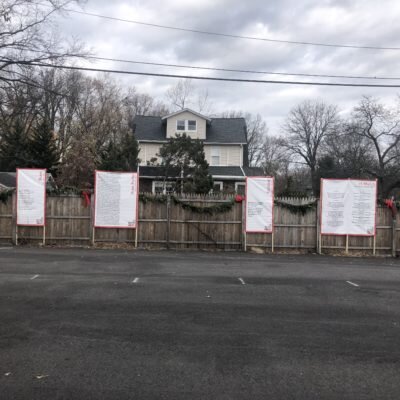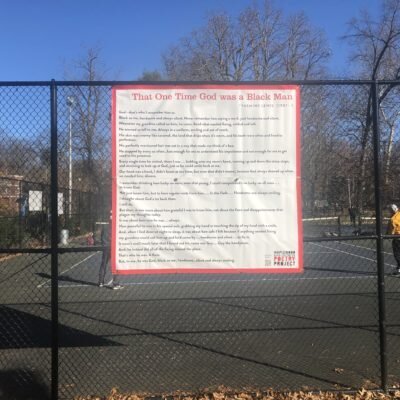38 Poems by Black Authors Installed in Maplewood to Celebrate Black Lives Matter Movement
From Maplewood’s Black Lives Matter Poetry Project:
Maplewood’s Memorial Park is quiet these days. The concerts and festivals have been put off indefinitely; the baseball diamonds are empty. On a stroll through the park this fall, you may have found a few folks walking dogs or picnicking six feet apart.
But now, on your quiet walk, you will begin to encounter the poetry of Black writers. For example, as you sit on a bench near the duck pond, you will be able to contemplate three poems—written in three different centuries—that channel voices of anger, remembrance, and strength to create a powerful chorus: we can no longer, and never again, bury our history of systemic racism.
The poems are part of Maplewood’s Black Lives Matter Poetry Project—a rich assemblage of poems by American Black poets that are currently being installed throughout Maplewood’s shared spaces. In our business districts and pedestrian thoroughfares as well as parks, 38 poems printed on large banners will live among us during the coming months. As part of our public landscape, these poems are meant as points of reflection, to help us consider what it means to be free in the face of oppression. Poems by Langston Hughes, Maya Angelou, Nikki Giovanni, Ross Gay, Audre Lorde, Lucille Clifton, Jericho Brown, Rita Dove, Tracy K. Smith, Elizabeth Alexander, Amanda Gorman, and other internationally acclaimed writers will hang next to the work of 13 vastly talented local poets, including teachers and students.
Maplewood’s Black Lives Matter Poetry Project, a creation of the Maplewood Arts Council, aims to celebrate and shine a light—literally, the light of day—on the words of Black poets. “We felt strongly about responding to the death of George Floyd and so many others by using public art,” said Marcy Thompson, co-founder and Chair of the Arts Council. “At this moment when the world seems challenged both articulating through language, and truly listening, we decided that poetry should be our medium. The particular power of poetry is to distill language to help us arrive at a deeper understanding and a powerful feeling of resonance.”
“Poetry comes from the heart, bringing meaning and purpose,” said Township Mayor Frank McGehee. The five-member Township Committee voted on Tuesday night to allow one poem, Langston Hughes’, “Let America Be America Again” to be placed on the lawn in front of Town Hall. This gesture is the first of its kind in our community and speaks to the power of this moment in the cultural life of Maplewood.
Township Committee Person, Vic DeLuca, was instrumental in forwarding the goals of the Arts Council, “The poetry project gives our community a chance to come together after a divisive time in our nation’s history.”
Arts Council co-founder Tricia Tunstall added, “We want our town to be brimming with the beauty and variety of Black poetic voices. We will all benefit from living among these great poems, and we hope they will spark dialogue and nourish our community.”
The Arts Council has created a webpage with short biographies of every poet; on each poetry banner is a QR code that will take viewers straight to that site. The poems themselves are not on the website; you are encouraged to visit the poems outdoors in the community! Maps of all the poems’ locations will soon be available for those who would like to follow their own “poetry trails.”
Maplewood poets are excited to have their works featured. Yasmine Lewis said she is “proud to be included in this project that celebrates and acknowledges some of the many aspects of Black experience.” Shawn Jones felt that the project “is essential because it will reach readers who may not otherwise encounter a poem, especially one about race.” LeShannon Wright hoped that her words will “not only have fed your eyes, but also danced in your hearts.”
Poet Nubia Duvall Wilson said, “We cannot heal unless all Americans understand historically where we’ve been, what racism looks like today, and how we are failing, so that we can solve these issues together.”
And Eric Shorter noted that he wrote his poem “in honor of the BLM movement, after turning off the news yet again in abject sadness…and thinking very much about what it means to be free.”
Perhaps the most poignant poems are the ones hung at three Maplewood schools, written by their own students and teachers. “I write poetry to articulate my thoughts and feelings surrounding social injustice,” said poet Amina Swarns, a 7th-grader. “I am thrilled to contribute to a project that will have an impact on my community.” Ms. Swarns’ poem will adorn the façade of Maplewood Middle School.
And poet Heru Stewart, a 5th-grade teacher at Jefferson Elementary School, said, “These public displays of warm and relevant poetry are a beacon and reminder of the resilience and humanity in us all.“ This beloved teacher’s poem will stand in front of Jefferson Elementary School.
Columbia High School Principal Frank Sanchez spoke of the CHS students whose poems are included in the project. “Salman Rushdie praised the power of the poet ‘to name the un-nameable, to point at frauds, take sides, start arguments, shape the world, and stop it from going to sleep,’” he said. “Our faculty is so proud that Columbia students have taken up that mantle.”
The Maplewood Arts Council spent much of the summer and fall planning the project. The 11-member advisory committee began by compiling a long list of poems, then passed that list along to a panel of local Black artists who considered which poems would resonate most in the Maplewood community. “I felt honored to have been a part of this needed and special project,” says singer and music educator Lori Mirabal, one of the panelists.
Performing artist Ahmondylla Best, also on the panel, said the project “may be a necessary step towards not only helping to lift society’s heavy veil of ignorance, indifference, apathy, and fear but also to disinter the precious literary buried treasures written by Black people.”
For panel member Brenda Pressley, an actor, “This project has been an act of love and caring, not only for our town of Maplewood, but for our entire country as well. These poems explore the challenges of our past and present, while daring us all to demand a brighter, more equitable future. I am honored to have been a part of the process!”
All of the poems are used with the permission of the authors or their estates. Funding for the project, which is slated to remain in place for six months, was provided through generous individual donations from the community and the contributions of two local businesses, The Able Baker and [WORDS] Bookstore. Readings will be scheduled throughout the life of the project, and special programming will take place during Black History Month in February.
Maplewood Arts & Culture director Ana De Archuleta affirmed that the township welcomes the project. “These poignant written words of lived experiences have the ability to convey profound awareness and effect positive change,” she said. “We are proud to back the Maplewood Arts Council in this relevant project.”
Mayor McGehee added, “Thank you to the Maplewood Arts Council for bringing this project to life.”
All 38 poems will be up by the end of next week; an unveiling and reading will be announced shortly.
For a list of poems, poet biographies, and locations, please visit the website. For further information, please contact maplewoodartscouncil@gmail.com



